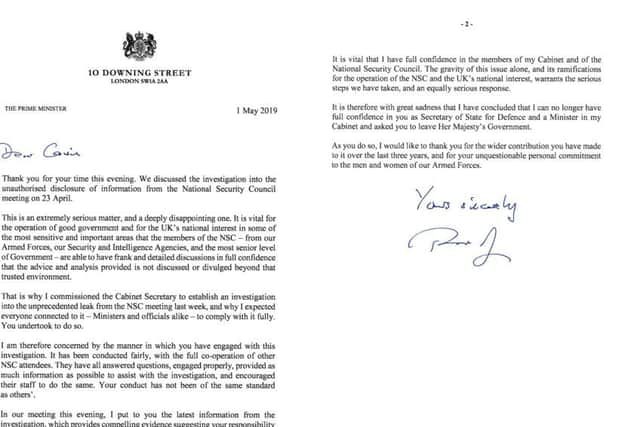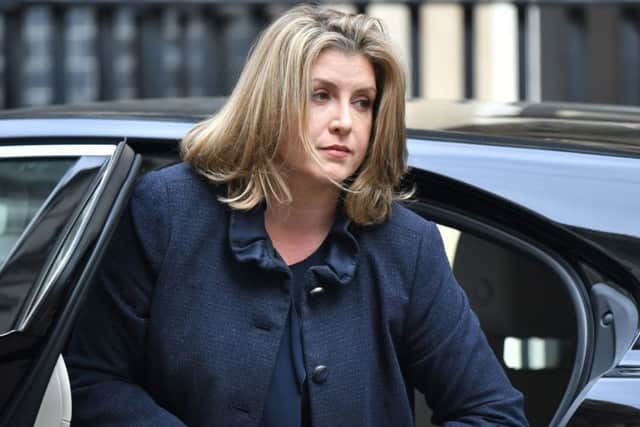Gavin Williamson downfall reveals Tory malaise under Theresa May – Tom Richmond


For the first time since she took office, Theresa May issued the marching orders rather than waiting for an errant Minister to fall on their sword for policy or personal lapses – or for a Cabinet colleague to quit in a Brexit firestorm.
Born in Scarborough, Mr Williamson will go down in history as the first casualty of a Whitehall leak inquiry since Sir Leon Brittan, the then Richmond MP, quit as Trade and Industry Secretary in 1986 over the Westland scandal.
Advertisement
Hide AdAdvertisement
Hide Ad

But it is the PM who will be vulnerable to any counter-attack if – and that is the key word – Mr Williamson can prove that he did not breach National Security Council confidences, and the Official Secrets Act, about Chinese telecoms giant Huawei.
And Mrs May is also potentially liable because she sanctioned Mr Williamson’s promotion when he put himself forward to be Defence Secretary – a position for which he had no discernible qualification – after Sir Michael Fallon quit in November 2017 when allegations emerged about his previous behaviour towards women.
Advertisement
Hide AdAdvertisement
Hide AdSir Michael’s downfall began a circuitous chain of events which has seen the famous black door of 10 Downing Street effectively become a revolving door because of the unprecedented turnover of top Ministers.


In short, less than half of the senior Cabinet Ministers appointed immediately after the last election nearly two years ago are still in the same job today (at the time of writing) – a remarkable rate of attrition for a Prime Minister who staked her reputation on being ‘strong and stable’. As well as Mrs May, the great and not-so-great survivors are Philip Hammond (Chancellor), Liam Fox (International Trade), Greg Clark (Business), Michael Gove (Environment), Andrea Leadsom (Commons leader), Baroness Evans (Lords leader), Alun Cairns (Wales), David Mundell (Scotland) and Chris Grayling (Transport).
And the churn is such that officials at key ministries are now working under their third Secretary of State in under two years. For the record, previous reshuffles at the end of last year saw Stephen Barclay become the third Brexit Secretary since June 2017 and Amber Rudd, who resigned as Home Secretary over the Windrush deportation scandal, return to office to fill the void at the Department of Work and Pensions. No wonder policy progress is so elusive.
Now the very able former diplomat Rory Stewart is the third International Development Secretary since the last election while his predecessor, Penny Mordaunt, makes welcome history by becoming Britain’s first female Defence Secretary. And it is here, in one of the most important departments of all, where the lack of continuity is so destabilising for members of the Armed Forces and intelligence services – the people tasked with upholding this country’s national security.
Advertisement
Hide AdAdvertisement
Hide AdAgain, she is the third Defence Secretary since the election. But the Naval reservist – at least she is qualified – is the seventh occupant of this post in a decade, a record which makes Second World War hero Denis Healey’s stint here at the height of the Cold War, lasting nearly six years, look even more remarkable.
Yet, while the public have become immune to Cabinet resignations because of their frequency, the cumulative effect is even more bad government from a Cabinet already condemned as the most ill-disciplined in history by Chief Whip Julian Smith, the man tasked with upholding discipline (of sorts).
It adds to the chaos at a time when the whole Government is bogged down by Brexit trench warfare – Health Minister Caroline Dinenage admitted as such when asked about delays to social care reforms – and when Parliament is in legislative limbo because Mrs May is too weak to unveil a new Queen’s Speech as it will be, potentially, defeated by MPs and force a general election.
However, with Mrs May struggling to fill junior posts because there are so many disaffected MPs on her backbenches refusing to serve due to Brexit, or being unsuited for office, this paucity of talent does not bode well for the Tories who still regard themselves as the natural party of government.
Advertisement
Hide AdAdvertisement
Hide AdAnd while the coming days will clarify Gavin Williamson’s culpability over leaks, the more fundamental question, moving on, is how best to improve the quality and calibre of Ministers – and whether new appointees need to be subjected to more intense scrutiny before they take office. Prime Ministerial whims at a time of political crisis are not the best recruitment strategy.
For, if a business changed most of its top team in such a short period, it would expect results to suffer. And it is the same with the Government – the only difference is that it is taxpayers who pay the price for all those Ministers, in addition to Chris Grayling, simply not up to the job.